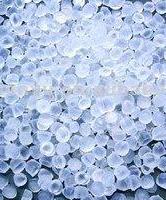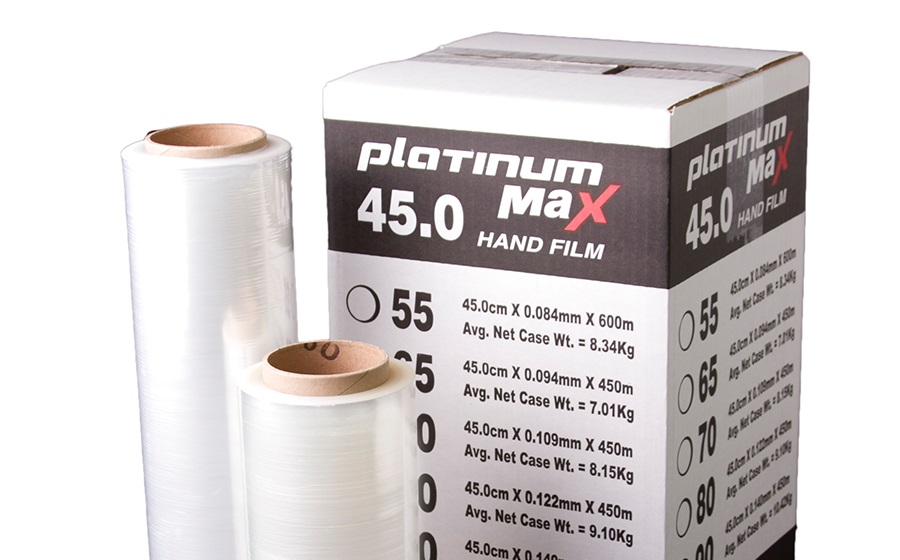Linear Low Density Polyethylene Resin

LLDPE stretch film, made from linear low density polyethylene resin, is a thick, strong, stretchy plastic that is wrapped around heavy loads on a pallet for shipment. LLDPE is a semi-crystalline polymer with many short branches on its molecular chains. These main molecular chains do not become as easily entangled as HDPE and LDPE. Due to being semi-crystalline, LLDPE plastic is more prone to high shrinkage rates due to the volume it occupies in its melted state rather than in its solid state. LLDPE also does not have memory retention. Once LLDPE stretches, it does not recover. Its lack of recovery can be desirable for applications such as stretchable pallet films.
LLDPE is a commonly used thermoplastic widely relied upon in the packaging industry. LLDPE is a valuable resource, as it can simply be formed into thin film materials yet retain its tensile strength. LLDPE can elongate while retaining its durability. The linear nature of the polymer makes LLDPE ideal for walled applications, such as garbage bags, floor tiles, shopping bags, pallet stretch film, and industrial liners.
LLDPE offers many advantages and is well-suited for applications which require thin film. This material provides a stable set of physical properties, such as its high tensile strength and impact resistance, as well as high puncture resistance, excellent stretchability, and flexibility. LLDPE has low shearing and consistent melt flow along with the ability to be a thin but strong film. This material boasts excellent barrier properties, with effective resistance to oxidation and protects against environmental wear and tear.
LLDPE resins are equally excellent for flexible and rigid applications. LLDPE stretch film is often used for packaging purposes, but it can also be used for non-packaging applications, too. Flexible applications or rigid applications of LLDPE stretch film depend on the products they are covering and whether they require abrasion resistance, durability, and clarity.
Commonly, LLDPE stretch film is used to hold bulk items in place and is wrapped at the end of the packaging process. This ensures products do not shift during transit. Do you look to conventional methods such as metal strapping to hold your load on a pallet? How does stretch wrapping differ from metal strapping? Toronto Stretch Wrap and Danshar Polybag and Resin Inc. can help you reach conclusions.
Linear Low Density Polyethylene Resin Stretch Wrap is Cost-Effective
It is important to consider how you wrap your loads for shipment. Metal strapping does not detour possible pilferage and leaves merchandise susceptible to damage when in transit, making linear low density polyethylene resin stretch wrap the best option. Stretch wrapping protects loads from the elements and possesses superior load containment. Stretch wrap is not only cost effective but also has the best performance. Stretch wrap does not shrink when heat is applied to it. Additionally, stretch wrap can be recycled, making it an environmentally friendly option.
LLDPE can be recycled and utilized into many different products, such as composite lumber, flooring, industrial bins, or new plastic films for consumers.
Different Types of Linear Low Density Polyethylene Resin Stretch Wrap
There are many different types of linear low density polyethylene resin stretch wrap available on the market today. Each type can address the specific needs of your business, such as load sizes, budget, and stretch film requirements. Cast, Blown, Hand, Machine, Specialty, and Converted films are all commonly offered stretch films. At Toronto Stretch Wrap and Danshar Polybag and Resin Inc., we are committed to offering the best stretch films on the market.
Cast stretch film, also called cast wrap, is manufactured through the cast extrusion process. Cast film is associated with clear optics, exceptional stretch and cling properties, high tear and puncture resistance, consistently thick film, and is quiet when unwound.
Blown stretch film is manufactured through the blown extrusion process. Blown stretch film is associated with hazy optics, high force on loads, and is noisy when unwound. Therefore, we do not offer blown film.
Hand stretch film is designed to be applied manually. Also referred to as hand wrap, it is recommended to be used when wrapping less than 15 loads per day.
Machine stretch film is designed to be applied with a stretch wrapping machine. Machine stretch film is more advantageous than hand film because it results in reduced packaging costs, faster and more efficient packaging process, safer stretch film application, and more securely held loads. Using machine stretch film is recommended when wrapping 15 loads of more per day.
Specialty stretch film is designed to address very specific packaging needs that other stretch film options cannot accommodate. Specialty stretch films include coloured film, UV film, and specialized private label programs.
Converted stretch film is produced through the conversion process, offering pre-stretch film that can be stretched before application. Because of this, converted stretch film is significantly less expensive than other film. Converted film is also recyclable, strong, with consistent material throughout.
Toronto Stretch Wrap and Danshar Polybag and Resin Inc. can help you find the best linear low density polyethylene resin stretch wrap for your business. Contact us today.
2899 Steeles Ave. W.,
Units 9 & 10,
North York, Ontario
M3J 3A1
Fax: 1-855-669-6184
For skid quantities of stretch wrap, resin, or plastic bags only, please call
416-993-6804
orderdesk@torontostretchwrap.com
By appointment.
